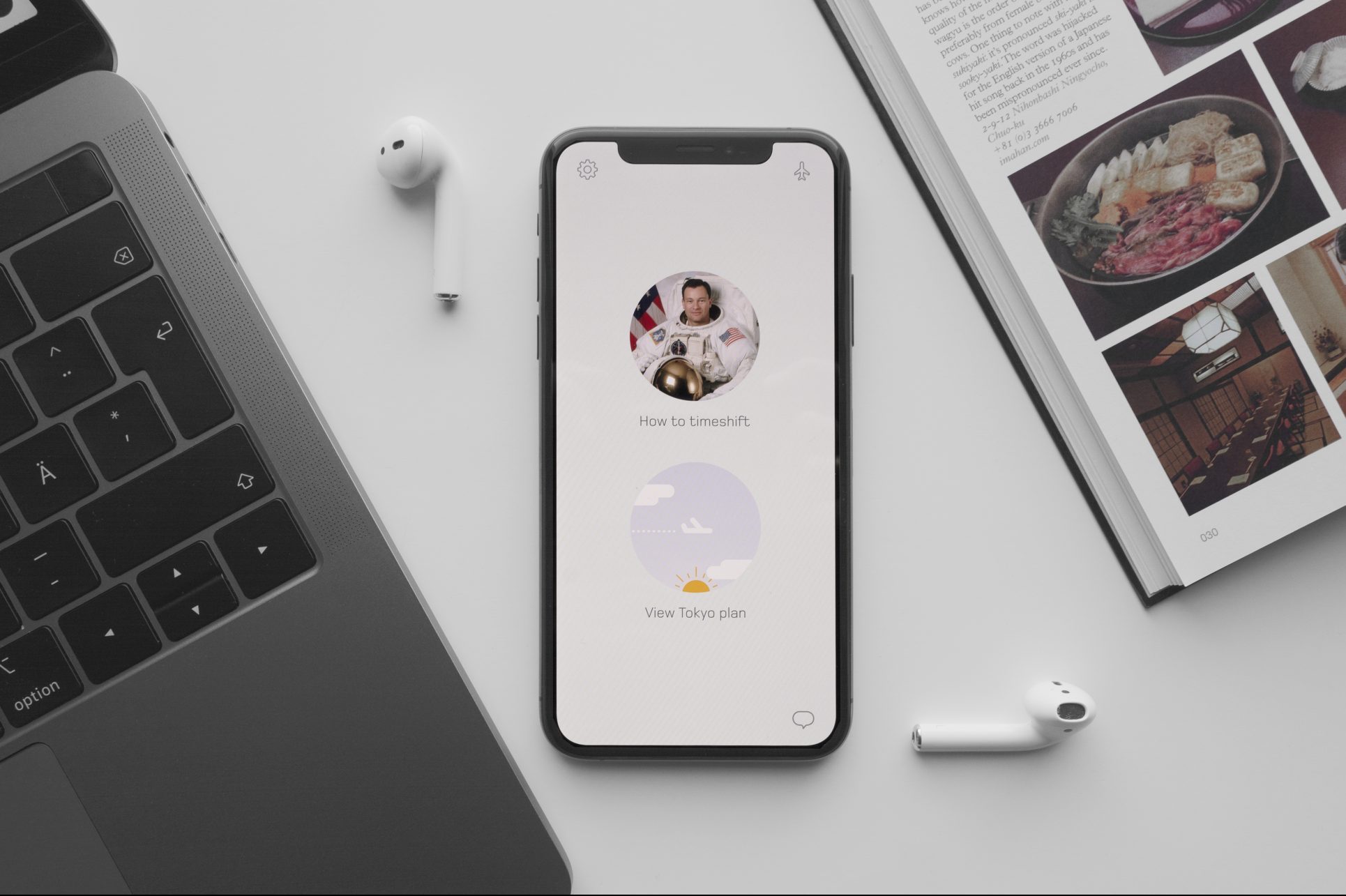Skift Take
Timeshifter, brandishing NASA-approved science, wants to revolutionize how the travel industry helps guests fight jet lag. The science has won consumers over — and is a no-brainer for airlines. But in Asia’s cutthroat hotel business, how it can integrate the app into different branded programs is perhaps a different science.
Timeshifter is on a mission to introduce to hotels more scientifically sound ways to help guests fight jet lag, and Asian hotels are listening.
After raising $1.45 million from angel investors in a recent funding round, version 2.0 of the jet lag app went live last week, spring boarding the company into its next phase — travel industry partnerships.
The app democratized the use of a method previously accessible only to NASA astronauts and Formula One drivers by launching v1.0 in June last year. Today, long-haul travelers need only to enter their flight itinerary into an app to generate a circadian science-based jet lag plan that notifies them of specific actions that must be taken at specific points. This level of precision is crucial to minimizing the time taken to realign “internal clocks” to new timezones.
Next Stop: Asia
After more recent enhancements made to the app, Timeshifter, which tied up with Six Senses Hotels Resorts Spas last year, is now ready for widespread travel industry partnerships.
Co-founder and CEO Mickey Beyer-Clausen told Skift in an interview in Singapore on the sidelines of the Global Wellness Summit that “the reason why we were holding back was because the initial version, while more than a minimum viable product, had its limitations for frequent travelers. We couldn’t introduce airline partnerships previously as not all passengers’ itineraries worked on the app.”
For example, before the upgrade, travelers could only enter their immediate next trip at any one point. On the latest of the app however, users can enter multiple destinations and unlimited trips. Other upgrades include easier and more intuitive itinerary input and the ability to edit flights.
Beyer-Clausen said that Timeshifter is now in talks with at least 15 airlines worldwide. Collaborations that prospective partners are studying range from Timeshifter being offered as a loyalty benefit or an ancillary service, up to more complicated product integrations.
On the hospitality front, Six Senses is already offering Timeshifter as a complimentary service for guests.
Beyer-Clausen shared that he was in Singapore to explore opportunities with other prospective Asian partnerships. The company had been working on deals in the US and Europe, but Asia-Pacific is compelling for big brands such as Singapore Airlines.
“When you’ve just started a company, focus is key. If there were 1,000 opportunities out there, we want to narrow down to just three so we do not fail in our execution. For us it’s very much about being opportunistic, but also being careful about what we choose to focus on. And Asia has huge potential for us. Singapore is definitely very important, being a hub to Asia-Pacific and home to amazing travel brands.”
Have Hotels Got it Wrong?
When it comes to jet lag remedies like sleep programs, massages and juices, hotels have their hearts in the right place, but not their science, Beyer-Clausen said at the Global Wellness Summit.
Combating jet lag is essentially about adjusting the circadian cycle to the new time zone as quickly as possible. It takes very precise steps to achieve this, with the right interventions (light and melatonin) at the right point of the journey.
Common wisdom suggesting travelers can arbitrarily sleep their jet lag off, without consideration for when to introduce or restrict light, could in fact make jet lag worse, the science shows.
Yet, in the travel industry, jet lag remedying claims continue to be centered on sleep. Hotels provide high-quality mattresses, pillows and blackout curtains.
Beyond mattresses and pillows, hotels also offer acupuncture, massage, special diets and the like as jet lag remedies. “These are great for health and well-being, but not for jet lag,” Beyer-Clausen reiterated.
“[The industry as a whole] needs to move completely away from this focus on sleep/fatigue and address the underlying causes of jet lag instead,” he argued.
But has the industry been behind on making this shift because of a lack of awareness, or does it come down to cost and returns on investment?
Beyer-Clausen claims that “just 1 percent” of travel industry players the company has met had heard of circadian science, and recognized that “what they’re doing now to [help address jet lag] is not it.”
However a poll of hoteliers at the summit suggests there was already awareness of circadian rhythms and their overall implications on combating the effects of jet lag.
For example, Allen Law, CEO of Park Hotel Group, which has a strong positioning in Asia’s business travel segment, said: “I’ve heard about it and yes, if the science is sound, we are definitely open to offering the app to our guests.”
Still, he expects the app will complement rather than replace existing sleep solutions, which have been yielding guest satisfaction, he said. “We want to give our guests a choice. In our experience, longhaul travelers appreciate the pillow menus we offer.”
Industry Norm?
For now, there is much to gain from taking on the innovation, according to Beyer-Clausen . “It sends out the message that the company is forward-thinking and care about their guests,” Beyer-Clausen said.
But beyond that, Beyer-Clausen said the personalized circadian plans Timeshifter provides will become an industry norm rather than a good-to-have.
“As people start to learn about the implications of circadian rhythms on jet lag, they will come to expect a solution based on that. The forward-thinking travel brands know that if they don’t start understanding the science now, in two to five years from now, others will get ahead.”
If circadian-backed hospitality solutions were to become standard, their purveyors will have to work on product integration to longterm hotel partners.
“Not only would [the first movers] have implemented services around circadian management, they would have learnt how to integrate them best. For example, personalized in-room lighting in hotels that helps [realign circadian rhythms according to individual guests’ flight details],” he continued.
Companies like Six Senses continue to rely on branded programs to compete in Asia’s booming wellness tourism market. In other words, once more Asian players start partnering Timeshifter, it will be the brand rather than the science that will set one hotel apart from another.
Six Senses CEO Neil Jacobs told Skift, “We love Timeshifter and think it’s an amazing idea. It was a leap-of-faith partnering them, but the app is now a lot further along than it was 18 months ago. We have to figure out a way to continue working together. At Six Senses, we have the Sleep with Six Senses program, which uses market-tested methods and segues into other areas like food. It has to all come together. Timeshifter still has to be integrated within a wider offering within our brand.”
Timeshifter is already working on how it can implement more complex partnerships, including those that require product integration.
“The angel investment has gotten us this far [with product development]. We are now raising $2 million in seed funds to get to our next inflection point, which is to implement big partnerships with airlines [and hotels]. It’s going to cost money to do these partnerships well,” Beyer-Clausen said.
The Daily Newsletter
Our daily coverage of the global travel industry. Written by editors and analysts from across Skift’s brands.
Have a confidential tip for Skift? Get in touch
Tags: asia, loyalty, mobile apps, wellness
Photo credit: Timeshifter - The Jet Lag App. Timeshifter

